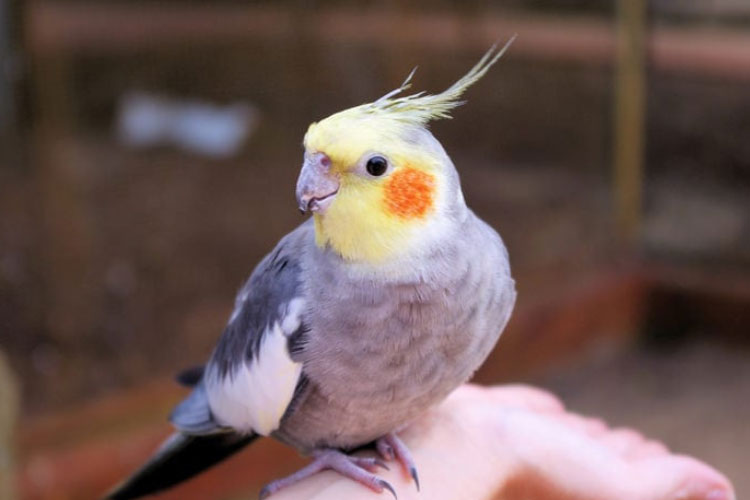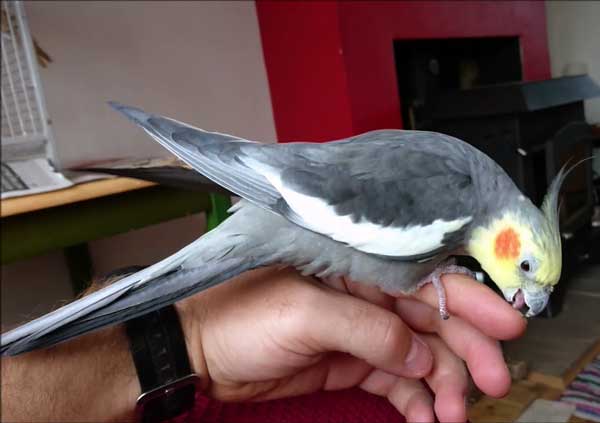You have probably heard the phrase, “don’t bite the hand that feeds you.” But when it comes to your cockatiel, they might not always follow this saying. Cockatiels can be scared of their owners and react in various ways. Sometimes they’ll hide under furniture or fly away if they feel threatened, while other times, they’ll bite or scratch their owners.
So, why is your cocktail scared of you? Your bird might be afraid of you if you just acquired it. The cocktail will also be scared of you when you take it to a new environment, especially in a confined space. Other things that can make your parrot afraid include a lack of trust, negative moods, stress, and a lack of companionship.
The good news is that this behavior isn’t permanent and can be reversed with gentle training techniques and plenty of patience. Here’s why your bird is scared of you and how to fix that.
Why is your cocktail scared of you? Here are the answers
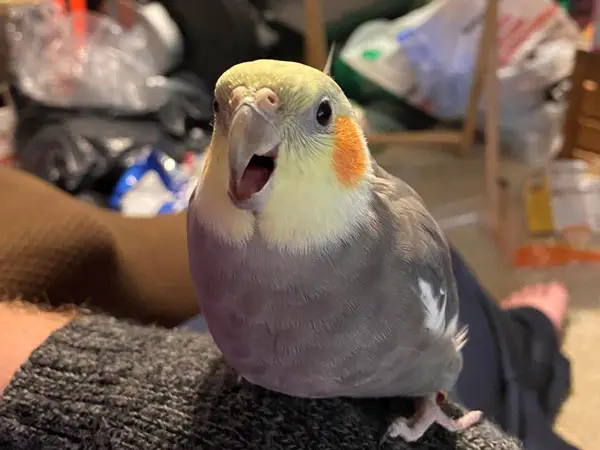
Below are the reasons why your bird is scared of you:
1. Aggressive in nature
If your cockatiel seems to be scared of you, it’s probably not because you’re a mean-spirited person. It might be because your bird is aggressive in nature.
Cockatiels are sometimes aggressive toward humans, making them seem like they want to escape. The bird might be nervous about everything. It may not like being picked up, having its nails trimmed, or being fed. In reality, they’re just trying to protect themselves from harm—and fighting back is the best way for them to do that!
2. Lack of trust
When your cockatiel is scared of you, it can be difficult to understand why. After all, it’s not like you’re doing anything that would scare it.
The truth is that cockatiels are very intelligent birds and have a basic understanding of their surroundings. In fact, they can recognize their owner by their voice or footsteps alone! So if your cockatiel has been behaving strangely lately, its behavior has changed for the worse. It probably lacks trust in you.
They might have seen you do something that triggered their mistrust, like shouting or yelling at them. So consider the way you talk to the bird. If you talk or call them in an aggressive tone, they might feel threatened and become scared of you onwards.
3. Not Got Acquainted with Humans Yet
Your cockatiel is scared of you because it has just been purchased and is not used to being around people. It is also likely that it has never been handled by anyone except the breeder who sold it to you.
When taking your parrot to a new house, it’s important to remember that they are still little babies. They are learning about their new environment and how to adapt to it.
Your cockatiel may be scared of you because it doesn’t know how to handle being alone and/or away from its parents. Besides, they might not have interacted with humans before. So it may want to shy away from you and other people in the house, like your kids.
4. Depression or mood swings
Parrots experience hundreds of emotions, from happy to sad to angry to excited. Sometimes, however, they also experience negative emotions like fear or aggression. Anything unpleasant can depress them, like loud music, other aggressive pets, storms or thunders, etc.
The fear or depression could worsen your relationship with the bird by leaving them more nervous around you.
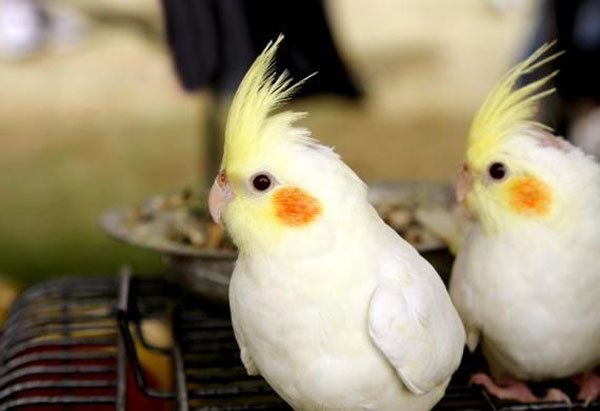
However, If you notice your pet bird flying around in circles or biting at its cage bars—this can signify that it’s moody and not in the right mental state to socialize with you.
5. Lack of companionship
Parrots are social animals, and they need companionship. If you don’t provide them with enough human interaction and remain away from them for a longer time, they can get bored and start acting out, biting, or behaving aggressively with the owner.
If this happens often enough, your parrot may have become intolerant to human companionship. NCBI research says only a few birds can be domesticated without needing companionship. Parrots are not among those. The source further states that your relationship with them could affect their quality of cohabitation.
6. Unconducive environment
You might be surprised to learn that your pet cockatiel isn’t scared of you. Rather, he or she is probably scared of the environment around you.
Cockatiels like lots of space and quiet time—and they don’t like being disturbed while sleeping! If your bird’s cage happens to be near a window or door where people come and go often, it can also cause some anxiety in them which can affect your relationship with bird.
7. Previous mistreatment
If your cockatiel has been mistreated in the past, it can become afraid of its owner. An abused or neglected bird will usually be very nervous around people.
Parrots have memory; if they have been mistreated previously, they won’t forget quickly and will take time to trust humans again.
Signs that your cockatiel is scared of you
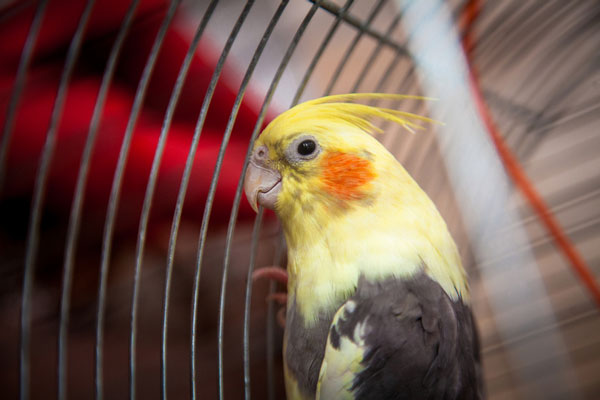
So, how do you find out your parrot is scared of you and not anything else? Here are the tale-tell signs to check out for:
- Biting: When your cockatiel bites you, it’s a sign that it’s scared of you. It doesn’t want to be handled and will try to bite your hand or arm.
- Screaming: Cockatiels often scream for their own amusement, but sometimes it’s because they’re scared and not liking the place or environment they’re in. If your bird screams for no reason, it could mean that something has startled them or they may not be liking your company.
- Body language: They may exhibit an extended neck, tight or slicked feathers, unfurled wings or raised chest. Another sign is if your bird becomes quiet and attempts to hide under furniture whenever you enter the room.
What to do if your cockatiel is scared of you
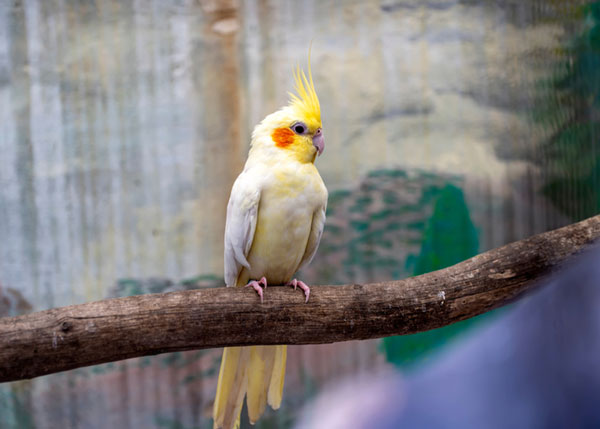
If your cockatiel is scared of you, you can do a few things to help them feel more comfortable around you. Here is what you should do:
1. Speak softly and calm
Cockatiels are very sensitive creatures, so start by speaking in a calm, soothing voice that makes it clear that you will not hurt them or anyone else. If you’re in a situation where this isn’t possible, act like nothing’s wrong. Try to smile and make eye contact with the bird.
If you are angry, it’s best to avoid the bird as it is intelligent and can read your moods.
2. Give the cockatiel treats
If your cockatiel is scared of you, it may also be because they need something from you to feel safe or comforted. So try giving them some treats while speaking calmly and reassuring them that everything is okay now.
Cockatiels are creatures of habit and will respond more positively to a treat. Giving the birds treats will make them feel like you’re on their side.
3. Put them in a conducive environment
You can help your cockatiel be comfortable around people by putting them in a room with no noise. This will help them feel more at ease. You can also place the cage away from windows or keep the curtains closed.
Finally, if you have pets such as dogs or cats that might scare your cockatiel, try moving them out of sight until the bird feels more comfortable around them again.
4. Play some music
Music is another great way to help your cockatiel get used to being around other people and learning about new environmental noises. Whether you play classical music or pop songs on repeat, playing background noise will help soothe your bird. Do not play loud music. Go for cool and soft tracks for them to feel comfortable.
5. Be gentle to your bird
Approach your bird gently. Do not try to surprise your parrot. Cockatiels are very fast flyers and will likely run away if they feel threatened. If this happens, try not to chase after them. Instead, call them over with food or toys, so they don’t associate being scared with those things either!
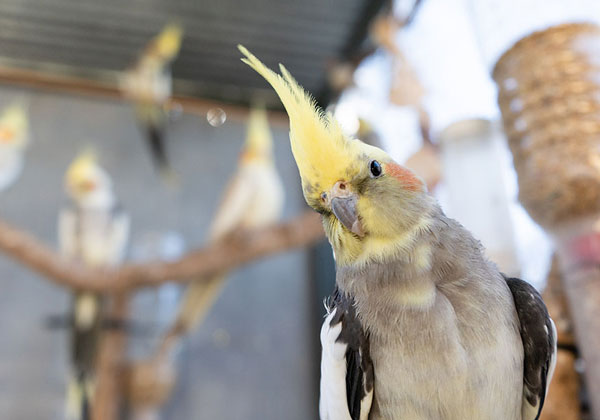
6. Create time for your bird
One of the best ways to make your cockatiel feel more comfortable around you is by creating a time for them to get used to being around people. This can be as simple as putting your bird in a cage and going out of the house for an hour or two every day. It can also be as involved as petting and playing with your bird for hours.
If you are busy, consider getting a pet sitter to come in and spend time with them while you’re at work or running errands. The important thing is that you do something to ensure your bird gets used to people.
7. Get another cockatiel
A second bird might help your cockatiel feel more secure. Ensure the second parrot is used to people and not scared of you. This will help the other bird to see that you are harmless and friendly. Don’t forget to quarantine the new bird for a few weeks before putting them in the same cage.
FAQs
Here are the answers to some related questions regarding getting scared of you.
It can take weeks for a cockatiel to get used to you, so don’t expect immediate results. Instead, be calm and reassuring, and let the bird know you’re there to help them. Don’t try to force them into your arms. Wait until they come willingly and slowly move into your hands.
Once your bird gets used to you, it will start cuddling with you. The cockatiel will also groom you, flip their wings when around you, bow their heads, chatter at you, and grind their beak. You will also notice that their pupils dilate when you are around, make eye contact, and mimic you.
First, be patient. You should know that this is a very common problem in pet birds and can take time to resolve. You mustn’t force the issue. Be gentle to them, treat them with nice food, take them out, and spend a lot of time with them. The more time you spend with your bird, the faster it will become used to you.
Conclusion
The best way to help your cockatiel feel safe around you is to understand their fear and how you can help them overcome it. So, start by understanding why your cockatiel is scared of you in the first place. It’s definitely not because they hate you—it’s more likely that they’re just scared of new people and situations.
To help your bird overcome this fear, you’ll need to spend some time with them in a quiet environment where they’re comfortable. Be calm and talk to it nicely. Most importantly, be patient and do not force issues.
